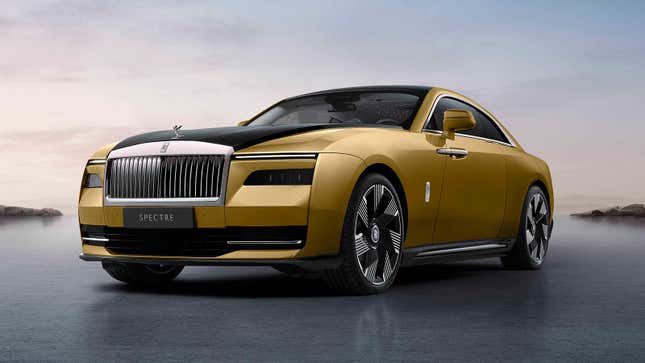
Rolls-Royce has taken the rather overwhelming wrap with all the words on it off of its first electric vehicle, the Spectre. That’s a fortunate thing, because the Spectre looks much better this way.
Rolls-Royce’s first EV just so happens to be a fastback coupe, and an elegant one at that. It doesn’t look terribly different from Rolls-Royce’s prior, internal-combustion-powered models. If I didn’t know this was a battery-electric car, I wouldn’t necessarily jump to that conclusion — though the design of the wheels might tip me off, to be fair.

Let’s discuss those wheels. They are 23 inches in diameter, and not just because Rolls-Royce chose to make them that large. No — the vehicle’s proportions “required” it, which is another way of saying this car is really big! From Rolls’ press release:
The silhouette’s most dramatic feature is Spectre’s fastback. The proportional demands of Spectre’s scale required Spectre to be the first production two-door coupé to be equipped with 23-inch wheels in almost one hundred years. This design treatment marries the iconography of Spectre’s spiritual successor, the Phantom Coupé to a contemporary Rolls-Royce design.

The Spectre is 17.8 feet long — only four inches shorter than a Hummer EV — and 6.8 feet wide. It weighs 6,559 pounds, which is 1,200 pounds heavier than the Wraith, the gasoline-powered coupe that the Spectre will effectively replace in the Rolls lineup.
Because the Spectre is so...sturdy, it can’t quite match the speed of other electric vehicles. Rolls-Royce says this striking coupe makes 577 hp and 664 lb-ft of torque, enabling a 0-60 mph time of 4.4 seconds. Of course, straight-line sprinting isn’t really the sort of performance Rolls-Royce deals in, but I like that we’re in an age where your average electric crossover could likely beat a Rolls-Royce coupe in a straight line.

What your average electric crossover doesn’t have, though, is Rolls’ new “Planar” suspension. It’s designed to prepare the Spectre for the road ahead through the use of many sensors and software, feeding hardware. Think of it as an adaptive suspension that’s constantly evaluating the road ahead to anticipate imperfections as they arrive. This is how the company describes it:
Using new hardware components and leveraging Spectre’s high-speed processing capabilities, the Planar system can decouple the car’s anti-roll bars allowing each wheel to act independently, preventing the rocking motion that occurs when one side of a vehicle hits an undulation in the road. This also reduces high-frequency ride imperfections caused by shortcomings in road surface quality.
Once a corner is identified as imminent, the Planar system recouples the components and stiffens the dampers, the four-wheel steering system is then prepared for activation to ensure effortless entry and exit. Under cornering, 18 sensors are monitored, and steering, braking, power delivery and suspension parameters are adjusted so that Spectre remains stable. The result is effortless control.
...and, theoretically, the sensation that you’re gliding on air. The Spectre will keep that up for an EPA-estimated 260 miles on a fully-charged battery.

Open the Spectre’s rear-hinged doors and you’ll find the inside looks less like a prototypical EV and more like a Rolls-Royce. Which is to say, there are circular vents, LED-illuminated “stars” in the headliner and door cards, plenty of chrome, and real, physical buttons. Do you miss actual buttons in modern car interiors? Rolls-Royce will let you have your buttons and knobs again, provided you’re ready to drop roughly $400,000.

I say “roughly” $400,000 because Rolls is keeping the pricing details on Spectre close to the vest for now. The company will only say that the Spectre is positioned between the $350,000 Cullinan and $460,000 Phantom, and that it launches at the end of 2023. You have to wonder how much of that sum is down to the cost of those wheels.